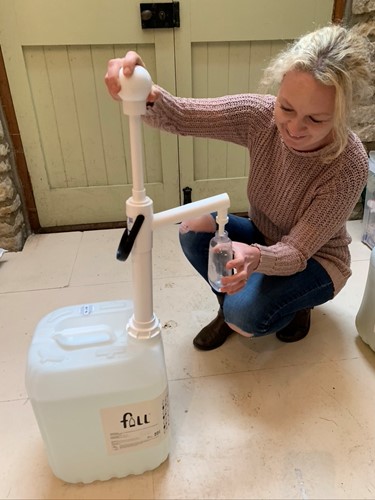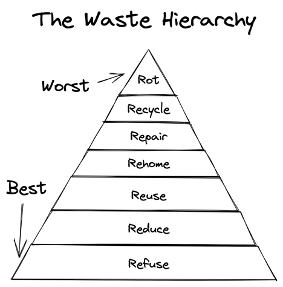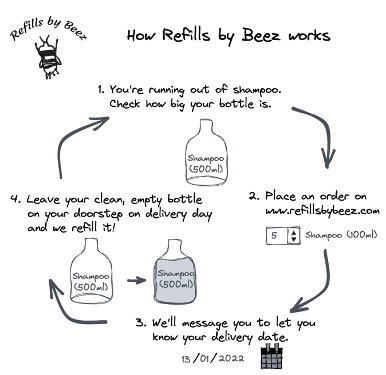Recycling is a good place to start but have you considered Refilling instead?
Take a look around your home. How many plastic bottles can you see? Shampoo, shower gel, washing up liquid, hand soap…The list in my house was long!
What do you do with these plastic bottles when they are empty?
Hopefully the answer isn’t that you throw them in the bin, where they end up being incinerated or in landfill.
If the answer is that you recycle them, you might be pretty shocked at what that really means for the environment.
Recycling is a good place to start, but it is only one step better than throwing them away (rot) if we look at the waste hierarchy (taken from The Sustainable(ish) Living Guide by Jen Gale).
This may be obvious but just in case:
Refuse: Not buying/using a product in the first place
Reduce: Buying less and also reducing what you already have
Reuse: This includes upcycling as well as refilling containers
Rehome: To friends, family, via charity shops etc.
Repair: You can do this yourself or find someone else with the necessary skills
Recycle: The product is processed into raw ingredients to be used to make other products
Rot: Landfill or incineration
If you want to live a bit more sustainably and make a positive impact on the climate crisis it is much better to refuse, reduce or reuse compared to recycling.
You may well be asking why this is.
- Unfortunately putting a plastic bottle into the recycling bin does not guarantee it is going to be recycled. Contaminated (e.g. not cleaned out) bottles, certain colours (often black), small lids and pumps can’t be recycled. And it is not only that one item that won’t be recycled, whole batches of recycling can be rejected if any of these items are mixed in. Less than 10% of plastic in the UK actually gets recycled.
- Crucially, energy is used to transport, sort, clean, and process the items you have put in your recycling bin back into raw ingredients. It takes as much energy to recycle a plastic shampoo bottle as an LED light bulb uses in 36 hours!
- Shockingly over half of the plastic packaging that is sent for recycling in the UK is actually sent abroad, often to poorer countries with less infrastructure for recycling.
- Recycled plastic can only be used to make certain items eg. carrier bags, flower pots, wheelie bins. Many other items including food grade plastic are made from ‘virgin plastic’. Fossil fuels are extracted and transported during plastic production and greenhouse gases are released during plastic refining and manufacturing.
So what can be done instead?
Refuse and reduce are often hard when it comes to items you need eg. soap, shower gel.
Refilling (reuse) is an alternative option.
The network of refill shops across the UK is growing. This is a community with a common goal of helping in the fight against climate change by supporting individuals to live more sustainably.
Refills by Beez is one such shop. We provide a doorstep delivery service to Bicester and the surrounding villages to refill your own containers with household cleaning products and toiletries. (www.refillsbybeez.com).
In January 2022 there was a national campaign encouraging people to start small and refill #justonebottle. Imagine the impact it would make if all households across the UK did this.
Why don’t you start today and refill #justonebottle.


